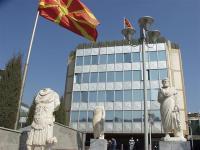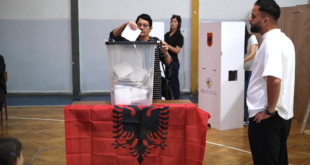MACEDONIA
 Opposition claims that the 2001 Ohrid Peace Accord is a dead letter are unfounded, Macedonia’s Deputy Prime Minister Abdilakim Ademi says.
Opposition claims that the 2001 Ohrid Peace Accord is a dead letter are unfounded, Macedonia’s Deputy Prime Minister Abdilakim Ademi says.
The pact ended that year’s short-lived ethnic Albanian insurgency, promising the country’s largest minority official recognition of its language and culture and positive discrimination in state employment.
Talking to state-owned news agency MIA, Ademi, who is responsible for the realisation of the accord’s provisions, said that there is no need for a new agreement and that most of the agreements provisions are functioning.
“The Framework Agreement [Ohrid pact] is Macedonia’s future and all factors should contribute to its implementation – which means all political parties – as it opens the road for Macedonia’s EU membership,” Ademi said.
Menduh Thaci, the head of the opposition Democratic Party of Albanians, DPA, told a Monday press conference that he had considered asking Albanian Prime Minister Sali Berisha to block Macedonia’s NATO membership bid during their meeting in Tirana last week. The DPA is a signatory to the accord.
Explaining his position, he said that the agreement had not been implemented properly and that this failure leads to discrimination against ethnic Albanians and greatly favours the ethnic Macedonian majority. He called for a new deal to be reached which would supplement the accord’s provisions.
Most of the laws deriving from the Ohrid agreement have been adopted but more should be done to ensure their practical application, Ademi said, describing the Law on Languages and power decentralisation process as Accord pillars. The agreement’s spirit should prevail, he said.
Some local analysts have rebuffed Thaci’s Monday statement as an attempt to score political points.
“This is merely a desperate attempt to regain the [DPA’s] lost popularity through radical statements,” Biljana Vankovska, from Skopje’s Faculty for War and Peace Studies, told local daily Unrinski Vesnik.
Thaci’s told the press on Monday that his party will boycott parliament.
The DPA boycott will not harm the government’s work since the party has only three deputies in the 120-seat legislature. However, observers are concerned that the move could harm the country’s EU accession process by ruining the impression that positive inter-party dialogues exist. This is one of the benchmarks that the EU requires of Macedonia.
Thaci’s critique comes only a couple of months before the European Commission publishes its annual report on the country’s reform progress this autumn. Skopje hopes the report will include a recommended date for the start of EU accession talks.
Vankovska says that the chances are slim that Albania would even consider vetoing Macedonia’s NATO accession.
“With his statement Thaci implies he has some kind of special relationship with the Albanian PM. But Albania is not the same country as in the past, it is now a NATO member state that follows a certain framework,” Vonkovska said.
Albania and Macedonia were initially slated to receive an invitation to enter NATO in 2008, but Macedonia was left out due to Greece’s unwillingess to allow its neighbour to enter the alliance while the countries’ naming dispute remains unresolved.
 Eurasia Press & News
Eurasia Press & News


